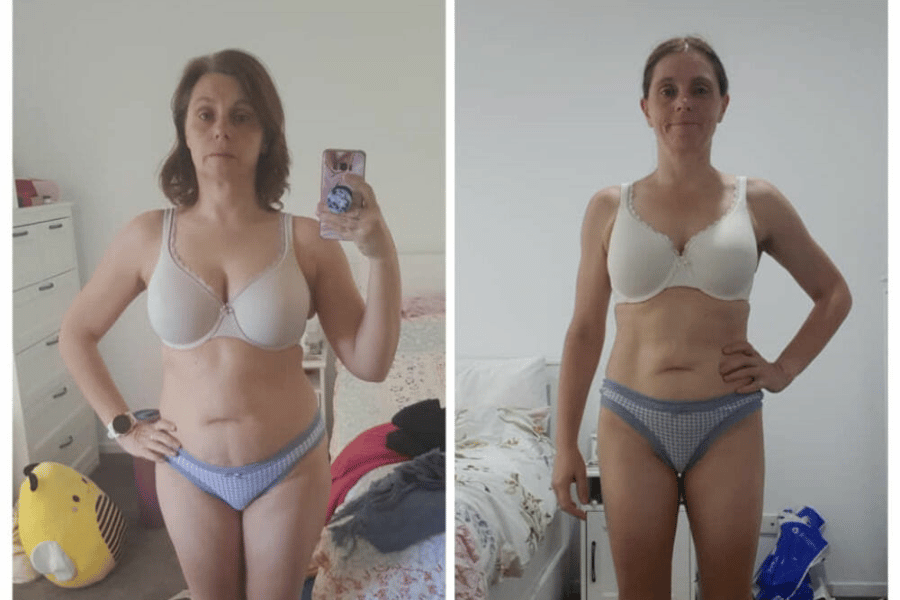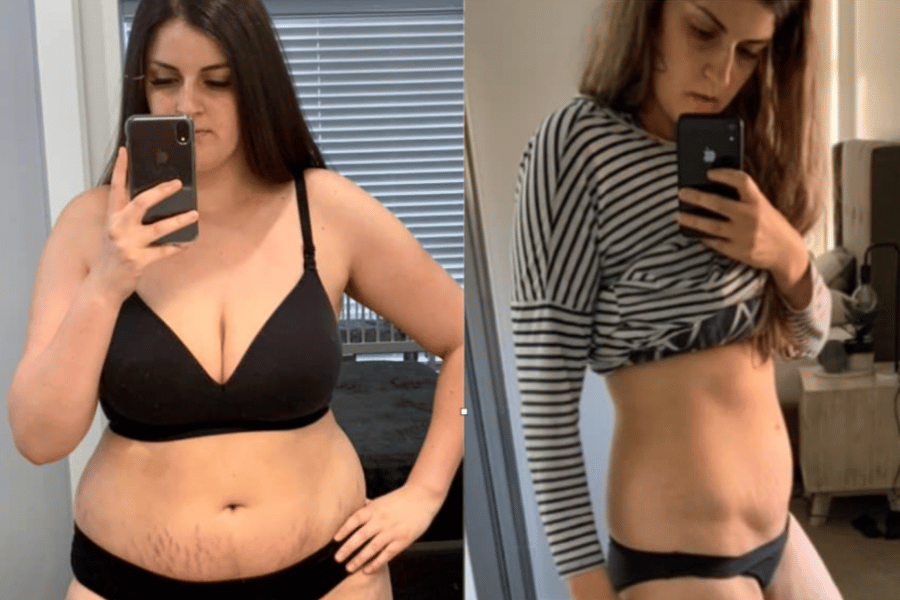In recent years, the interest in veganism for weight loss during menopause has seen a remarkable surge, reflecting a shift towards more health-conscious lifestyle choices among women. This phenomenon, referred to as “vegan menopause weight loss,” has gained recognition not just as a dietary trend but as an integral part of women’s health and well-being.
As we embark on this informative journey, we promise to delve into the myriad of strategies and techniques that make weight loss achievable and sustainable through a vegan diet during this transformative phase of life. This approach not only promises a natural solution to managing menopausal symptoms but also offers a pathway to holistic health and vitality. By the end of this article, you will be equipped with practical knowledge and insights to make informed decisions about your health, especially during the winter months when maintaining a healthy lifestyle can be more challenging.

The Vegan Menopause Connection: Understanding the Basics
Menopause marks a significant transition in a woman’s life, characterized by the end of menstrual cycles. This phase often brings about profound changes in the body and metabolism, impacting health in various ways. One of the most common challenges faced during menopause is weight gain, primarily due to hormonal imbalances and a slowing metabolism.
In recent times, veganism has emerged as a holistic and effective approach to manage these menopausal changes, particularly in aiding weight loss. The vegan menopause weight loss strategy is gaining popularity for its ability to not only address the weight concerns but also alleviate other menopausal symptoms.
The core of a vegan diet during menopause focuses on eliminating animal products and embracing a plant-based diet. This shift is not just about cutting calories; it’s about nurturing the body with nutrient-dense, fibrous, and low-fat foods. These dietary choices have a profound impact on the body’s hormonal balance and metabolic rate, aiding in weight management. Additionally, a vegan diet is rich in antioxidants and phytoestrogens, which can help in balancing hormones naturally.
The adoption of a vegan diet during menopause is not just a fad; it’s backed by scientific studies that highlight the positive effects of plant-based nutrition on women’s health. By embracing a diet filled with vegetables, fruits, whole grains, and legumes, women can tackle the challenges of menopause effectively, promoting not only weight loss but also overall well-being.
Vegan Menopause Weight Loss Strategies
Technique 1: Plant-Based Nutrition
Plant-based nutrition is at the core of vegan menopause weight loss strategies. Emphasizing whole foods and nutrient-rich options, this diet focuses on fruits, vegetables, whole grains, nuts, and seeds. These foods are not only low in calories but also high in fiber and essential nutrients, aiding in maintaining a healthy weight during menopause.
According to the American Dietetic Association, a well-planned vegan diet can be nutritionally adequate and may provide health benefits in the prevention and treatment of certain diseases. This is particularly relevant for menopausal women who need nutrient-dense foods to counteract the metabolic slowdown.
Technique 2: Hormone-Balancing Foods
Certain vegan foods are known for their hormone-balancing properties, which can be especially beneficial during menopause. Foods like flaxseeds, soy, and certain vegetables contain phytoestrogens, which mimic estrogen in the body and can help balance hormones naturally.
The Physicians Committee for Responsible Medicine highlights the role of soy and flaxseeds in alleviating hot flashes and other menopausal symptoms, while also contributing to weight management.
Technique 3: Mindful Eating
Mindful eating is a key component of a successful weight loss strategy during menopause. It involves being fully present during meals, eating slowly, and paying attention to hunger and fullness cues. This approach helps in controlling portion sizes and making healthier food choices.
Harvard Health Publishing emphasizes the benefits of mindful eating, stating it can help combat the emotional eating often associated with menopause, thereby aiding in weight management.
Technique 4: Regular Physical Activity
Regular physical activity is crucial for effective weight loss during menopause. It not only burns calories but also builds muscle mass, which is important as muscle mass naturally decreases with age.
The Mayo Clinic recommends at least 150 minutes of moderate aerobic activity or 75 minutes of vigorous aerobic activity a week, along with strength training exercises, for healthy adults. This is particularly vital for menopausal women to boost metabolism and maintain muscle mass.
Technique 5: Supportive Supplements
While a well-planned vegan diet can cover most nutritional needs, certain supplements may be beneficial during menopause for weight loss and overall health. These include vitamin B12, vitamin D, calcium, and omega-3 fatty acids from algae sources.
The National Institutes of Health suggest that these supplements can help address potential deficiencies in a vegan diet and support overall health during menopause.
Technique 6: Emotional Well-being
Emotional well-being is deeply connected to successful weight loss during menopause. Stress management techniques such as meditation, yoga, and adequate sleep can significantly impact weight loss efforts.
The American Psychological Association reports that stress management is crucial for overall health, especially during menopause, as stress can lead to emotional eating and weight gain.
By integrating these techniques, women can navigate the challenges of menopause with a holistic and effective approach, leading to sustainable vegan menopause weight loss.
https://www.youtube.com/watch?v=fNJOsWXLW0U&pp=ygUbdmVnYW4gbWVub3BhdXNlIHdlaWdodCBsb3Nz
Applying Vegan Weight Loss Techniques to Your Daily Life
Implementing vegan menopause weight loss strategies into daily life requires a mindful approach and a commitment to personal health. Here are practical tips to seamlessly integrate these techniques into your routine:
Embrace Plant-Based Nutrition
- Start by gradually incorporating more plant-based foods into your diet. Focus on adding a variety of fruits, vegetables, whole grains, nuts, and seeds.
- Plan your meals around plant-based proteins like lentils, chickpeas, tofu, and tempeh to ensure adequate nutrient intake.
- Experiment with vegan recipes and explore different cuisines to keep your meals exciting and satisfying.
Balance Hormones with Vegan Foods
- Include phytoestrogen-rich foods such as flaxseeds, soy products, and certain vegetables in your daily diet to help balance hormones naturally.
- Pay attention to how different foods affect your body and symptoms. Keep a food diary to track these changes and adjust your diet accordingly.
Practice Mindful Eating
- Dedicate time for meals without distractions. Eat slowly and savor each bite to enhance digestion and satisfaction.
- Listen to your body’s hunger and fullness cues. Stop eating when you feel comfortably full, not stuffed.
Incorporate Regular Physical Activity
- Find activities you enjoy, whether it’s walking, yoga, cycling, or swimming. Aim for at least 30 minutes of moderate activity most days of the week.
- Include strength training exercises twice a week to maintain muscle mass, which is crucial for a healthy metabolism during menopause.
Utilize Supportive Supplements
- Consult with a healthcare provider to determine if you need supplements like vitamin B12, vitamin D, calcium, or omega-3 fatty acids.
- Choose high-quality, vegan-certified supplements to ensure they align with your dietary principles.
Foster Emotional Well-being
- Practice stress-relief activities such as meditation, deep breathing exercises, or gentle yoga.
- Ensure adequate sleep each night, aiming for 7-9 hours of quality sleep.
Personalize Your Approach
- Remember that each body is unique. What works for one person may not work for another. Be patient and willing to adjust your strategy as needed.
- Seek support from a nutritionist, especially one familiar with vegan diets and menopause, to tailor a plan that meets your individual needs.
By incorporating these vegan menopause weight loss strategies into your daily life, you can create a sustainable approach that not only aids in weight management but also improves your overall health and well-being during menopause.

Conclusion
The journey of vegan menopause weight loss offers a holistic and sustainable approach to managing menopausal symptoms while promoting overall well-being. The strategies discussed—embracing a plant-based diet, focusing on hormone-balancing foods, practicing mindful eating, engaging in regular physical activity, considering supportive supplements, and nurturing emotional well-being—collectively create a powerful blueprint for health and weight management during menopause.
This comprehensive approach not only aids in achieving weight loss but also enhances the quality of life by addressing the unique challenges women face during this transition. As we conclude, we invite you to share your thoughts and experiences. Are you intrigued by the potential of a vegan diet during menopause? How do you envision integrating these strategies into your life?
Remember, embracing a vegan lifestyle during menopause is not just about losing weight; it’s about embarking on a journey towards a healthier, more balanced self. Your thoughts and feedback are valuable as we continue to explore and discuss this important topic.
Essential Insights: Understanding Vegan Menopause Weight Loss
Q1: Can a vegan diet effectively support weight loss during menopause?
A: Absolutely. A vegan diet, rich in plant-based, nutrient-dense foods, can be highly effective in supporting weight loss during menopause. This diet typically includes lower calorie foods while providing essential nutrients, helping to manage weight without compromising on nutrition.
Q2: What are some key foods to include in a vegan diet for menopause?
A: Focus on hormone-balancing foods like flaxseeds, soy products, and cruciferous vegetables. Also, include a variety of fruits, vegetables, whole grains, and legumes to ensure a balanced intake of nutrients.
Q3: How does a vegan diet impact menopausal symptoms?
A: A vegan diet can positively impact menopausal symptoms by reducing hot flashes and improving mood swings, thanks to the high content of phytoestrogens found in many plant-based foods. These natural compounds mimic estrogen in the body, helping to balance hormones.
Q4: Are there any nutritional concerns with a vegan diet during menopause?
A: While a vegan diet can be nutritionally adequate, menopausal women should be mindful of potential nutrient deficiencies. It’s important to ensure sufficient intake of calcium, vitamin D, iron, and omega-3 fatty acids, which may require careful planning or supplementation.
Q5: Can a vegan diet help in managing emotional well-being during menopause?
A: Yes, a vegan diet can play a role in emotional well-being. Foods rich in omega-3 fatty acids, like algae-based supplements, and those high in antioxidants and vitamins can support mood and stress management.
Q6: How can I ensure I’m getting enough protein on a vegan diet during menopause?
A: Include a variety of plant-based protein sources such as lentils, chickpeas, tofu, tempeh, and quinoa in your diet. These foods provide adequate protein and are also rich in other essential nutrients.
Q7: Is it necessary to exercise alongside a vegan diet for effective weight loss during menopause?
A: Yes, combining a vegan diet with regular physical activity can enhance weight loss efforts during menopause. Exercise helps to boost metabolism, build muscle mass, and improve overall health.
Q8: What are some challenges I might face when adopting a vegan diet during menopause, and how can I overcome them?
A: Transitioning to a vegan diet can be challenging initially, especially in terms of meal planning and ensuring nutritional adequacy. Seeking guidance from a dietitian, experimenting with diverse recipes, and gradually making dietary changes can ease this transition.
Related Posts :
- En Does Vinegar Apple Cider Help You Lose Weight A Study Qwbu
- En 2023 Review Exploring The Benefits Of Vibez Keto Gummies For Ketogenic Enthusiasts In The United States C4wt
- En Does Apple Cider Vinegar Help You Lose Weight A 2024 Obwu
- En 2024s Top Keto Trend Activlife Keto Gummies And Their Impact On American Weight Loss Strategies 861f
- En Acxion Weight Loss Pills Reviews Y4k8